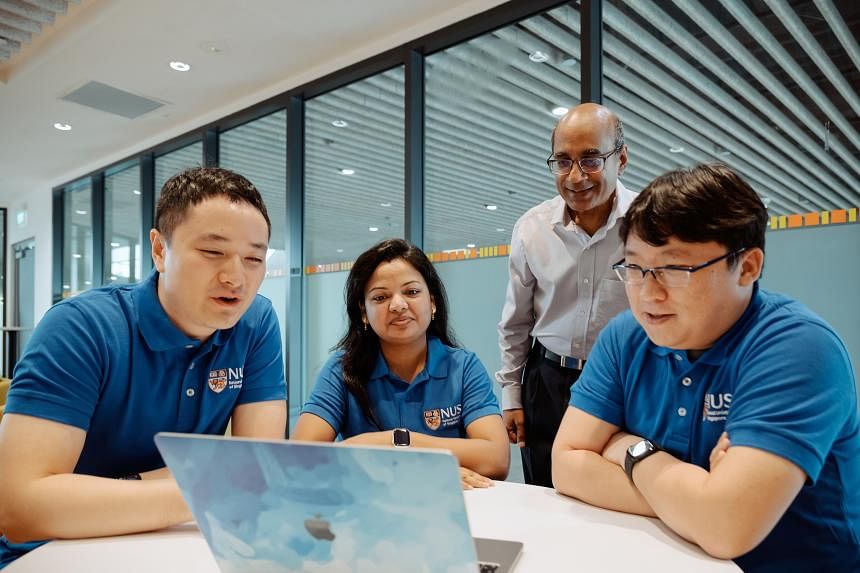SINGAPORE – When a user types in prompts such as “surgeon” or “doctor” into artificial intelligence (AI) text-to-image generators such as Dall-E 2 and Stable Diffusion, most images will depict men. And from the text prompt “office assistant”, most images generated will be of women, reflecting gender stereotypes.
Such ethical issues in generative AI are one problem the National University of Singapore (NUS) is working to tackle through its new AI research institute.
Launched on March 25, the NUS AI Institute (NAII) will conduct research on how to address the ethical concerns and risks associated with AI and to apply AI across various domains such as education, healthcare, finance and sustainability. More than 20 principal investigators from a wide range of disciplines across NUS – including business, computer science, data science, engineering, medicine, law and sustainability – will be driving more than 10 research programmes at the institute, NUS said in a statement.
NAII will provide a “go-to” platform for the cross-sharing of ideas and collaboration on AI initiatives within the university through seminars, workshops and outreach events that people from different domains can attend.
“Research is not tense or boring. It’s actually very exciting and very passionate,” said Professor Mohan Kankanhalli, director of NAII, adding that he enjoys discussions with his students, who often disagree with him. “That’s how science advances. Not by somebody all-knowing saying this is how it should be done. Research should involve healthy, vigorous, open conversations, debates, contradictions, a little bit of irreverence.
“So we are going to nurture this very vibrant, intellectual atmosphere we already have in our schools and faculties, but also in this institute, so that we can do the best possible AI research.”
The institute, which is housed within the university’s School of Computing (SoC), will also benefit experts, researchers and students from different domains looking to develop a project involving AI.
Some of SoC’s existing research centres and labs, including the NUS Centre for Research in Privacy Technologies and NUS-Tsinghua-Southampton Centre for Extreme Search, will evolve to be integrated into or affiliated with NAII, according to NUS. Through NAII, they will be able to tap the expertise of its wide range of partners and experts within and beyond NUS, such as overseas universities and industry research partners.
Currently, tech companies IBM and Google have agreed to collaborate with NAII as industry partners for research with the goal of spurring technological advancements and societal impact.
Mr Colin Tan, general manager and technology leader of IBM Singapore, said: “Through our new collaboration with NUS, we believe our joint efforts will further Singapore as the technology hub in Asia and globally.”
He added that IBM hopes to work with NUS to advance AI and generative-AI technologies. Sharing NUS’ vision, the company intends to jointly develop AI computing infrastructure that will be safe and beneficial to society, and be cost- and energy-efficient.
IBM and NUS will also work to empower local talent and enhance education through training for talent development and education as well as potential joint research activities, seminars and conferences.
The NAII’s AI for Education research will also provide learning opportunities, such as internships, for undergraduate and graduate students.
“Recognising the importance of growing a pipeline of AI talent, the institute will also provide exciting hands-on opportunities for NUS students who are keen to pursue a career in AI or explore entrepreneurial pursuits in this fast-growing field,” said Prof Kankanhalli.

For example, the institute will offer students in the NUS Graduate Research Innovation Programme – which guides researchers and postgraduate students to develop their own deep technology start-ups – the opportunity to work alongside researchers on real projects in AI. This puts it in line with the National AI Strategy 2.0 launched in 2023, which aims to nurture and attract talent into Singapore’s AI industry.
Furthermore, the institute will invite overseas Singaporean researchers to be involved in its projects and research.
Prof Kankanhalli said that if these overseas experts choose to collaborate with the institute, NAII will provide seed funding to facilitate the collaboration, incentivising them to return to Singapore and to view the institute as a “research home away from home”.
In addition to $8 million external research grants already secured by NAII researchers, NUS is investing $20 million to kick-start the institute’s endeavours in foundational AI research, which would include areas such as AI theory, AI hardware or software systems, as well as research on the societal implications of AI and its solutions to real-world problems.
NUS deputy president of research and technology Liu Bin said that NAII will serve as the university’s focal point to synergise its wide range of capabilities.
The institute’s fundamental research will drive cutting-edge advances in AI and interdisciplinary collaborations will translate research outcomes into creative solutions with deep social impacts, she added.

